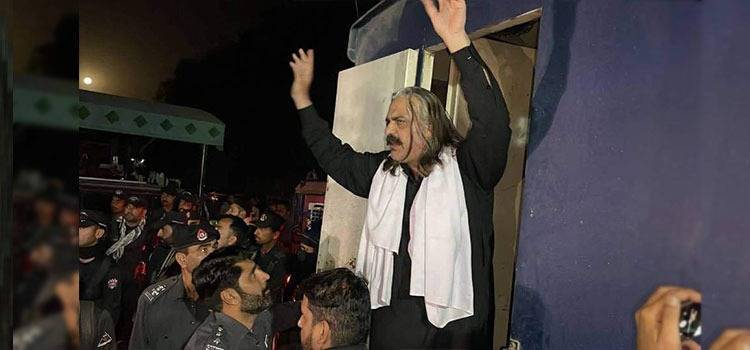
When Ali Amin Gandapur was elected as the chief minister of Khyber Pakhtunkhwa (KP), many political commentators criticised this decision of Imran Khan. They questioned his leadership capabilities, especially when discussions arose about his potential to lead a province as complex and diverse as KP.
A narrative emerged early on that Gandapur was more aligned with the military establishment than his political party, Pakistan Tehreek-e-Insaf (PTI), and its vision. Detractors accused him of prioritising the military’s interests over the party's agenda. However, as his tenure progressed, Gandapur silenced his critics through action, proving that his loyalty lay firmly with KP’s development and PTI’s policies.
When Gandapur assumed the role of KP's chief minister, it was a critical moment for both the PTI and the province. Located near the volatile tribal belt and the pourous border with Afghanistan, KP had long been a security hotspot. The military's influence in the province had historically been strong due to the ongoing counterterrorism operations and the sensitive nature of the region’s stability.
From the outset, Gandapur’s close relationship with the military raised concerns. Critics argued that he seemed more focused on aligning with the military establishment than on adhering to the PTI’s civilian-led governance model. Rumors circulated that Gandapur was prioritising military-influenced policies over PTI’s development agenda. Within the party, some members feared he was not doing enough to challenge the government or push for the release of PTI leader Imran Khan, leading to doubts about his commitment to PTI's political objectives.
However, Gandapur has proven to be an independent and decisive leader, vindicating Imran Khan's decision to name him as chief minister.
His bold move to engage directly with Afghan diplomats, despite criticism from policymakers in Islamabad who view foreign policy as the federal government's domain, demonstrated his resolve.
Once regularly critiqued by PTI supporters on social media for not doing enough for his party and leader, Imran Khan, Gandapur has now emerged as a rallying point for those very supporters
This initiative aimed to ease tensions with Afghanistan, a neighbour with deep, ethnic ties to the people of Khyber Pakhtunkhwa. Gandapur’s engagement with Afghanistan was primarily focused on improving law and order in the province, especially in his native southern districts, which have seen a surge in militancy.
Another significant decision was the removal of longstanding check posts across the province, a step previous PTI governments had not dared to take. For years, the people of KP expressed frustration with these checkpoints, which they felt were a source of harassment in their daily lives. By removing them, Gandapur addressed a longstanding public grievance. His decision to empower the local Jirga system for dispute resolution, particularly in the newly-merged districts, has also been widely welcomed. The lack of legal infrastructure in these areas caused great distress, and the revival of the traditional Jirga system is seen as a pragmatic solution to the challenges faced by local communities.
Gandapur’s support for the police in districts like Bannu and Lakki Marwat has also garnered significant local appreciation. Residents in these areas have praised his efforts to empower the police force, giving them greater autonomy to arrest individuals suspected of militant activity. His support came at a time when police forces across KP were demanding greater independence from interference by security agencies in their operations.
Gandapur’s rousing speech at a PTI rally in Islamabad further dispelled doubts about his loyalties. In a bold move, he openly challenged the establishment, proving to PTI supporters that he was not playing a "double game." By taking this stand, he reassured his supporters that he remains committed to the party’s mission and the province's welfare.
Once regularly critiqued by PTI supporters on social media for not doing enough for his party and leader, Imran Khan, Gandapur has now emerged as a rallying point for those very supporters. His bold and assertive style of governance has not only silenced his critics but also reinvigorated the party's base, inspiring hope for a future dominated by PTI.
His refusal to pursue a path of revenge against the police and civil servants who harassed him, his family, and his party workers during the caretaker period has garnered respect even from his political opponents. Despite pressure from his party members in Sindh and Punjab—who were urging him to retaliate in kind against their rivals—he remained firm in his belief that such actions would undermine the core values of Pashtun society. His principled stance has strengthened his leadership and earned him broader recognition.
Ali Amin Gandapur's tenure as chief minister of Khyber Pakhtunkhwa serves as a case study in managing the delicate balance between security and governance. While he initially faced criticism for his perceived alignment with the military, his actions have demonstrated that his primary focus is on delivering reform and development in line with PTI's vision. Gandapur has silenced many of his critics, proving that his loyalty lies with the people of KP and the principles of his party, not external influences.

